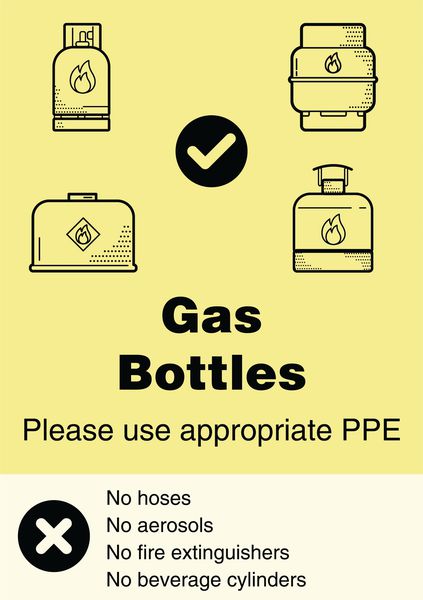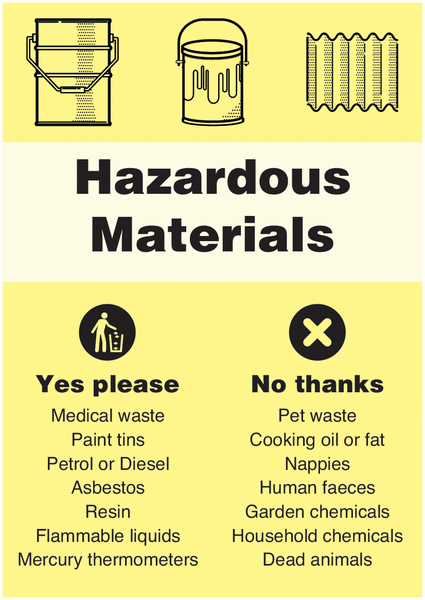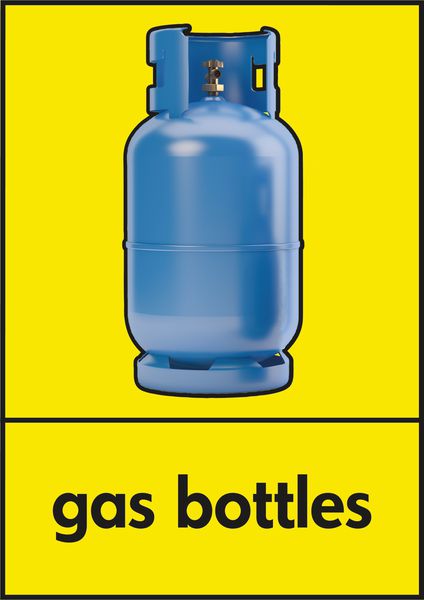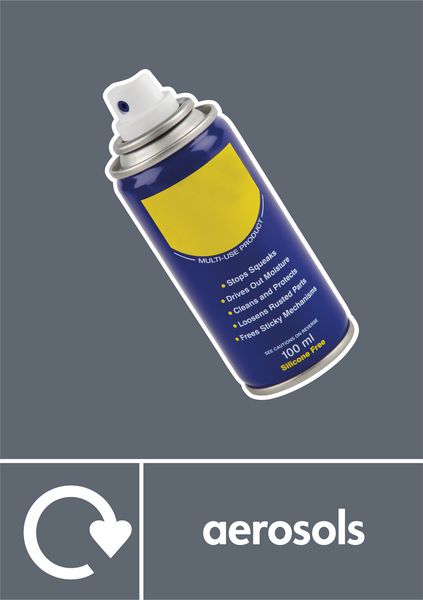-
 Customisable
Customisable

Custom WRAP Recycling Signs with Symbols
-
 Customisable
Customisable

Custom Photographic WRAP Recycling Signs
-
Promotion

Paint - WRAP Paint Waste Recycling Signs
From £6.99 To £26.99
From £5.84 To £22.73
Supplied in: Single -
Promotion

Aerosols - WRAP Metal Waste Recyling Signs
From £6.99 To £26.99
From £5.84 To £22.73
Supplied in: Single -
Promotion

Gas Bottles - WRAP Hazardous Waste Recycling Signs
From £6.99 To £26.99
From £5.84 To £22.73
Supplied in: Single -
Promotion

Asbestos - WRAP Hazardous Waste Recycling Signs
From £6.99 To £26.99
From £5.84 To £22.73
Supplied in: Single -
Promotion

Hazardous Waste - WRAP Hazardous Waste Recycling Pictorial Signs
From £12.99 To £15.99
From £10.67 To £13.49
Supplied in: Single -
Promotion

Hazardous Materials - WRAP Photographic Recycling Signs
From £9.99 To £15.99
From £8.81 To £13.94
Supplied in: Single -
Promotion

Paint - WRAP Photographic Recycling Signs
From £9.99 To £15.99
From £8.81 To £13.94
Supplied in: Single -
Promotion

Gas Bottles - WRAP Hazardous Waste Recycling Pictorial Signs
From £12.99 To £15.99
From £10.67 To £13.49
Supplied in: Single -
Promotion

Gas Bottles - WRAP Yes/No Recycling Symbol Sign
From £6.99 To £30.99
From £6.01 To £26.99
Supplied in: Single -
Promotion

Hazardous Waste - WRAP Yes/No Recycling Symbol Sign
From £6.99 To £30.99
From £6.01 To £26.99
Supplied in: Single -
Promotion

Gas Bottles - WRAP Yes Please/No Thanks Recycling Signs
From £6.99 To £30.99
From £6.01 To £26.99
Supplied in: Single -
Promotion

Hazardous Waste - WRAP Yes Please/No Thanks Recycling Signs
From £6.99 To £30.99
From £6.01 To £26.99
Supplied in: Single -
Promotion

Aerosols - WRAP Metal Waste Recycling Pictorial Signs
From £12.99 To £15.99
From £10.67 To £13.49
Supplied in: Single -
Promotion

Gas Bottles - WRAP Photographic Recycling Signs
From £9.99 To £15.99
From £8.81 To £13.94
Supplied in: Single -
Promotion

Aerosols - WRAP Photographic Recycling Signs
From £9.99 To £15.80
From £8.81 To £13.94
Supplied in: Single
Hazardous Materials Recycling Signs
Need help?
 Why is recycling hazardous materials important?
First Rate Hazardous Materials Recycling Signs - Fast Delivery
Why is recycling hazardous materials important?
First Rate Hazardous Materials Recycling Signs - Fast Delivery
Responsible businesses are paying close attention to recycling workplace waste these days. This is, of course, even more important when it comes to recycling hazardous materials, whether the items in question are chemicals, aerosols, medical waste or gas bottles.
To ensure that hazardous materials are recycled safely in your workplace, it is vital that staff, contractors and other visitors to your work sites know where and how to dispose of hazardous waste. This can be made clear by installing recycling signage and ensuring that points where hazardous waste can be disposed of are made obvious to all concerned. Our recycling signs include customisable signs to allow you to tailor your signage to your needs.

Expert Information
Also discover:
Safety signsRecycling SignsNon recyclable waste signPaper recycling signsOffice Recycling SignsPlastic Recycling SignsMetal Recycling SignsWRAP Recycling SignsRecycling LabelsFun recycling signs
Why Should I Recycle Hazardous Materials?
Recycling hazardous waste correctly is the safe and responsible thing to do, regardless of how common or mild the products you use may be. Even items such as cleaning chemicals and paint can often be considered hazardous materials and should be recycled accordingly. When it is possible to reuse, recycle or reclaim hazardous materials, this avoids the environmental hazards of disposing of the waste and protects natural resources. There can also be an economic benefit, as reusing and recycling hazardous materials can help reduce expenses and reliance on raw materials.
In the UK, businesses have a ‘duty of care’ to ensure that hazardous waste produced or handled by them does not cause any harm or damage. The Government has strict guidelines in place that must be followed. These will depend on whether your business produces and stores waste, collects and transports waste or receives waste for recycling or disposal.
How Do You Recycle Hazardous Materials?
If your company produces or handles any kind of hazardous waste, you will need to classify it and learn how to recycle or dispose of it safely. According to The Health and Safety Executive, waste is considered hazardous if it: “contains substances or has properties that might make it harmful to human health or the environment.”
Local councils may offer a collection service for some hazardous materials. There are recycling centres for some items that are considered potentially hazardous, such as batteries, ink cartridges, and electrical items, especially items that may contain CFCs and other chemicals, such as refrigerators and freezers.
What is Classified as a Hazardous Material?
Many items are classified as hazardous for various reasons. Here are a few of the products you may use in your workplace that are considered hazardous:
- Chemicals such as brake fluid, most paints and even printer ink
- Household batteries
- Car batteries
- Solvents
- Pesticides
- Asbestos
- Many cleaning products and garden chemicals
- Some small electrical appliances
- Many large electrical appliances such as fridges and freezers
- Fluorescent tubes
- Car oil
In order to classify your waste and find out if it is considered hazardous, you will need to go to the Government website and check the waste code or codes associated with that type of waste.
What Hazardous Material Recycling Signs Do I Need?
Placing clear and relevant recycling signs around your business premises is vital. Choosing exactly which ones you need will depend on the type of business you are and how much hazardous material you handle. Companies that routinely manage, store, transport, recycle or dispose of hazardous waste will need a lot more signs than a small company that simply needs to ensure that batteries and printer ink cartridges are correctly recycled. Our recommendation and the most effective recycling signs are all that follow the recycling sign logos from the Government's ‘Recycle Now’ campaign. Choosing these will make it even easier for everyone to not only remember to recycle but to do it with confidence.
Automotive companies, cleaning companies, painting and decorating companies, and hairdressers will, for example, all need specific signage based on the chemicals used and how the company policy addresses waste recycling and disposal. All employees should, of course, be made aware of your company’s policy in their initial and ongoing training, but good signage can remind everyone on a daily basis that they need to be mindful of how they are disposing of any potentially hazardous material.
Depending on the type of work carried out in your company, you may need pictorial signs reminding employees to dispose of chemicals responsibly, signs reminding employees and contractors where to leave large appliances for transport to recycling centres or signage to draw workers’ attention to facilities for recycling paint or gas bottles. You can rest assured that here at Seton, all our hazardous material recycling signs support the Government-led Waste & Resources Action Programme (WRAP) and incorporate WRAP’s ‘Recycle Now’ logo, which is becoming widely used and recognised by brands, retailers, local authorities and community groups.
Where Should Hazardous Material Recycling Signs be Placed?
Recycling signs should be placed around all work areas, outside work sites and communal areas to inform and remind staff and outside visitors of the company policy on waste disposal. It is essential to place signs instructing people how to dispose of hazardous materials in the areas where such materials are used or produced.
Material-specific signs should be placed on recycling bins and other receptacles designated for those materials. Recycling signage can also be very useful for indicating areas where larger items such as gas bottles, office equipment or large appliances can be left for eventual transport to a recycling centre.
Make sure signs are displayed where they can be clearly seen by people working in the area or passing through. There are a variety of convenient ways to secure your recycling signage in relevant positions around your premises. See our range of sign fixings to choose the best solutions for your various workspaces.
Best Hazardous Material Recycling Signs
The products you need will largely depend on your company, your activities and what kind of hazardous materials you need to recycle, but here are some of our top products.
Custom WRAP Recycling Signs With Symbols – These can be made to order and fully customised according to your business and the materials you handle. You can choose the colour, size and text to be displayed. Signs feature the WRAP ‘Recycle Now’ symbol and can incorporate your company logo.
Paint - WRAP Paint Waste Recycling Signs – These signs come in a range of sizes and materials. They feature a large image to draw attention to stations for recycling paint waste.
Hazardous Waste WRAP Yes/No Recycling Symbol Sign – Many workers may have questions about what can and cannot be recycled. These informational signs help make workers aware of where to put certain items. Signs are available in rigid plastic, vinyl or removable, repositionable vinyl. Options include a variety of sizes.
Hazardous Materials WRAP Photographic Recycling Signs – With a striking design to capture attention and encourage employees to recycle appropriately, these signs clearly indicate which recycling bin is for hazardous materials.
Gas Bottles – WRAP Photographic Recycling Signs – These signs feature a clear and bold design to ensure that employees working within spaces that use gas bottles know exactly where to deposit used bottles. Signs are available in a choice of sizes and materials.
If you have any questions about the type of hazardous material recycling signage you need for your business, please do not hesitate to get in touch. Our friendly experts are more than happy to chat with you about your organisation’s needs and requirements.


